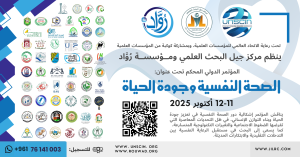
استخدام الذكاء الاصطناعي في التعليم: التطبيقات والتحديات
Using Artificial Intelligence in Education: Applications and Challenges
الباحثة سعداوي واضح جميلة (جامعة مولود معمري – كلية الحقوق)
Researcher Saadaoui Wahid Jamila (Mouloud Mammeri University – Faculty of Law)
ورقة منشورة في كتاب أعمال الملتقى الدولي حول التعليم من أجل التنمية المستدامة والابتكار المجلد (01) الصفحة 67.
مستخلص:
من أهم التحديات التي تواجه التعليم، افتقار العملية التعليمية لمناهج تسمح للتلاميذ والطلاب بحرية الابتكار والإبداع، وتزرع بداخلهم القدرة علي المبادرة الفردية واحترامها، والذي يخلق فيهم روح التنافس الشريف، والرغبة في تعليم الذات والاستمرار في ذلك طول العمر وتنمية المهارات المختلفة حسب متطلبات سوق العمل العالمي.
كذلك قصور أساليب تدريب المعلمين وقلة المصادر والموارد في إعدادهم سواء في تخصصاتهم أو رفع قدراتهم الإدارية والمالية والثقافية، وتزويدهم بالخبرات والقدرات الحديثة لخلق كتلة حرجة قادرة على إدارة التغيير.
ونظرا للأهمية التي يمثلها قطاع التعليم بالنسبة لعمليات تطويره وبخاصة ما يتعلق بتوفير احتياجات سوق العمل من أصحاب التخصصات والمهارات المختلفة ذات الصلة الوثيقة بسياسات وبرامج التطوير، فإنه لا مجال لأي تطوير للتعليم مالم يتم التجذير بداخله لكل جديد يتم الأخذ به، والجديد هنا هو تطبيقات الذكاء الاصطناعي حتى يكون أفراده على بينة بالمدلولات المختلفة لهذه التطبيقات، ومعرفة ألوانها، وتحديد سبل توظيفها واستثمارها في جنبات العمل التعليمي، وبالصورة التي يتواكب فيها مع المستجدات الحادثة فيه، ويمكنه من مواجهة تحديات المستقبل.
الكلمات المفتاحية: التعليم، الذكاء الاصطناعي، تحديات، مستقبل.
Abstract:
One of the most important challenges facing education is the educational process’s lack of curricula that allow pupils and students the freedom to innovate and create, and cultivate within them the ability for individual initiative and respect for it, which creates in them the spirit of fair competition, the desire to educate themselves and continue to do so throughout their lives and develop various skills according to the requirements of the global labor market.
There is also a deficiency in the methods of training teachers and the lack of sources and resources in preparing them, whether in their specializations or raising their administrative, financial and cultural capabilities, and providing them with modern experiences and capabilities to create a critical mass capable of managing change.
Given the importance that the education sector represents in terms of its development processes, especially with regard to providing the needs of the labor market for those with different specializations and skills closely related to development policies and programmers, there is no room for any development of education unless everything new that is introduced is rooted within it.
What is new here are the applications of artificial intelligence, so that its members are aware of the different meanings of these applications, know their colors, and determine ways to employ and invest them in aspects of educational work, and in a way that keeps pace with the developments occurring in it, and enables it to face the challenges of the future.
Keywords : Education, Artificiel intelligence, Challenges, Future.


